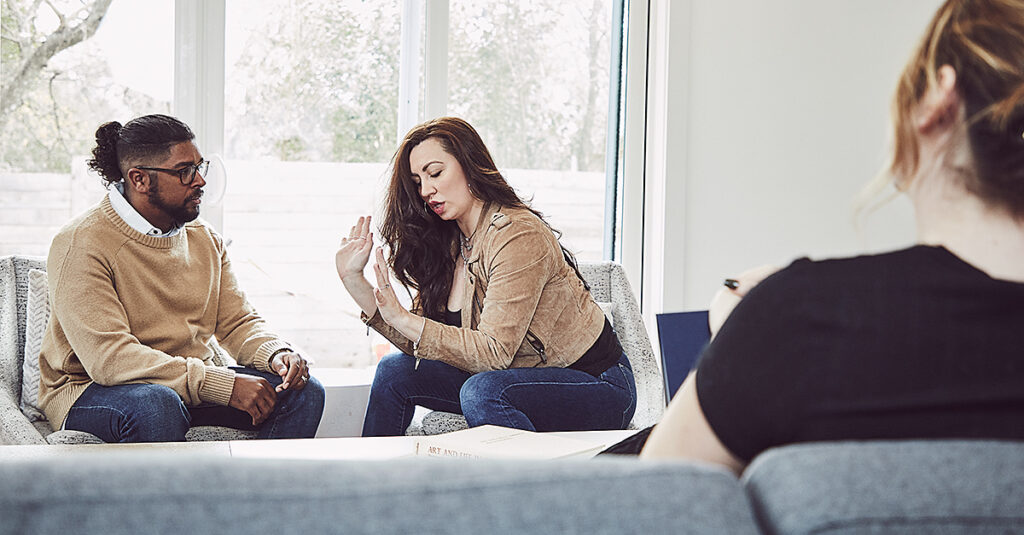Couples therapy, also known as marriage counseling or relationship therapy, is a form of therapy aimed at helping couples navigate and resolve conflicts within their relationship. When it comes to the topic of cheating, couples therapy plays a vital role in facilitating healing, rebuilding trust, and strengthening the bond between partners. In this article, we will explore the impact of cheating on relationships, the role of couples therapy in addressing infidelity, the process involved, and the benefits it can bring to couples seeking to overcome the aftermath of betrayal.
Contents
Understanding Cheating In Relationships

Cheating in relationships refers to the act of engaging in romantic or sexual activities with someone outside the boundaries of a committed partnership. It involves breaking the agreed-upon expectations of fidelity, exclusivity, and trust between partners. Cheating can take various forms, including emotional affairs, physical infidelity, or online relationships.
The motivations behind cheating in relationships can vary. Some common factors include a lack of satisfaction or fulfillment within the current relationship, a desire for novelty or excitement, emotional or physical dissatisfaction, unresolved conflicts or issues within the partnership, or personal factors such as a lack of impulse control or commitment.
Understanding the Impact of Cheating
Cheating in relationships can have a profound and lasting impact on both individuals involved and the relationship itself. The consequences of cheating can vary depending on the individuals and the specific circumstances, but here are some common impacts:
- Loss of Trust: Trust is the foundation of any healthy relationship. When one partner cheats, it shatters the trust that has been built, leading to a deep sense of betrayal. The injured partner may find it difficult to trust again, not only in the cheating partner but also in future relationships.
- Emotional Pain and Betrayal: Discovering that a partner has cheated often leads to intense emotional pain. The betrayed partner may experience feelings of sadness, anger, confusion, and low self-esteem. Emotional trauma can be long-lasting and can affect future relationships and personal well-being.
- Communication Breakdown: Cheating can disrupt open and honest communication between partners. The injured partner may struggle to express their emotions and concerns, while the guilty partner may feel guilt, shame, and fear of further consequences. The communication breakdown can make it challenging to address the underlying issues and rebuild the relationship.
The Role of Couples Therapy
Couples therapy, also known as marriage or relationship counseling, plays a crucial role in helping couples navigate the challenges and conflicts that arise in their relationship, including the aftermath of cheating. Here are some ways in which couples therapy can be beneficial:
- Facilitating Communication: Couples therapy provides a safe and structured environment for open and honest communication. A trained therapist can help couples express their thoughts, emotions, and concerns effectively, while also teaching active listening and conflict-resolution skills. Improved communication allows couples to better understand each other’s perspectives and work towards resolution.
- Rebuilding Trust: Trust is often deeply damaged after cheating occurs. Couples therapy can assist in the process of rebuilding trust by guiding transparency, and accountability and establishing healthy boundaries. Therapists can help the betrayed partner express their feelings of betrayal and assist the guilty partner in understanding the impact of their actions.
- Emotional Support: Dealing with the aftermath of cheating can be emotionally challenging for both partners. A couples therapist can provide a supportive environment where individuals can express their emotions, process their feelings, and receive validation. Emotional support from a neutral third party can be particularly helpful in navigating the complex emotions associated with infidelity.
The Process of Couples Therapy for Cheating

The process of couples therapy for cheating typically involves several stages aimed at addressing the impact of infidelity and rebuilding the relationship. While every therapist may have their approach, here is a general outline of what you might expect in couples therapy for cheating:
- Assessment and Exploration: In the initial stage, the therapist will create a safe and non-judgmental space for both partners to share their perspectives and experiences related to infidelity. They will gather information about the history of the relationship, the circumstances surrounding the cheating, and the emotional impact on both partners. This stage helps the therapist understand the dynamics of the relationship and identify specific areas to focus on in therapy.
- Emotional Expression and Processing: The therapist will facilitate open and honest communication between partners, allowing them to express their emotions, concerns, and needs related to infidelity. This stage provides an opportunity for the betrayed partner to share their pain, anger, and disappointment, while the guilty partner can express remorse, guilt, and a willingness to repair the relationship. The therapist helps create a safe environment for these emotions to be expressed and processed.
- Rebuilding Trust and Transparency: Rebuilding trust is a critical aspect of couples therapy after cheating. The therapist will work with both partners to develop strategies and practices that foster transparency, accountability, and honesty. This may involve setting clear expectations, establishing new boundaries, and developing methods for rebuilding trust over time. The guilty partner will be encouraged to demonstrate trustworthy behavior, while the betrayed partner will learn to gradually trust again.
- Identifying and Addressing Underlying Issues: Cheating is often a symptom of deeper issues within the relationship. The therapist will help both partners explore and address these underlying issues, such as communication problems, unmet needs, or emotional disconnection. By understanding and resolving these issues, couples can create a stronger foundation for their relationship moving forward.
Techniques and Approaches in Couples Therapy
Couples therapy incorporates a range of techniques and approaches to address the unique needs and challenges of each couple. Here are some common techniques and approaches used in couples therapy:
- Emotionally Focused Therapy (EFT): EFT focuses on understanding and reshaping the emotional dynamics within a relationship. It helps couples identify and express their underlying emotions, needs, and vulnerabilities. The therapist facilitates a process of creating new patterns of emotional connection and responsiveness between partners.
- Gottman Method Couples Therapy: Developed by Drs. John and Julie Gottman, this approach emphasizes building healthy relationship skills. It involves assessment tools to identify relationship strengths and areas for improvement. Therapists use interventions to enhance communication, manage conflicts, and foster intimacy. The method also emphasizes developing friendship and fondness between partners.
- Narrative Therapy: Narrative therapy explores the stories and narratives that couples hold about themselves and their relationship. The therapist helps couples deconstruct harmful narratives and co-create new, positive narratives that promote understanding, growth, and change.
- Solution-Focused Brief Therapy (SFBT): SFBT focuses on identifying and building on the strengths and resources of the couple. It emphasizes setting specific goals and finding practical solutions to address challenges. The therapist guides the couple to envision their preferred future and explore the small steps needed to reach those goals.
- Cognitive-Behavioral Therapy (CBT): CBT focuses on identifying and changing unhelpful patterns of thoughts and behaviors that contribute to relationship difficulties. The therapist helps couples recognize and challenge negative or distorted thinking, develop healthier communication patterns, and practice problem-solving skills.
Challenges and Considerations

Couples therapy can be a valuable tool for addressing relationship challenges, but it is important to be aware of potential challenges and considerations that may arise during the process. Here are some key points to keep in mind:
- Willingness and Commitment: Both partners need to be willing to engage in couples therapy and commit to the process. It requires active participation, honesty, and a genuine desire to work on the relationship. If one or both partners are not fully committed, the effectiveness of therapy may be limited.
- Timing and Readiness: Couples therapy may not be effective if it is initiated during a crisis or when one or both partners are still processing intense emotions related to cheating. It is essential to consider whether both individuals are emotionally ready and have had some time to process their feelings before embarking on therapy.
- Individual and Relationship Safety: Couples therapy should be conducted in a safe and non-abusive environment. If there is a history of domestic violence, ongoing abuse, or severe power imbalances in the relationship, couples therapy may not be appropriate or effective. Safety concerns should be addressed before engaging in therapy.
- Communication Challenges: Communication breakdown is often a significant issue in troubled relationships, including those impacted by cheating. However, therapy relies heavily on effective communication between partners. The therapist may need to help improve communication skills, manage conflicts, and establish a safe space for open dialogue.
- Individual and Relationship Dynamics: Each partner brings their unique perspectives, experiences, and expectations to therapy. The therapist must navigate and address these dynamics while maintaining a balanced and impartial approach. The therapist needs to avoid taking sides or favoring one partner over the other.
Conclusion
Couples therapy plays a crucial role in helping couples navigate the challenges that arise from infidelity. It provides a structured and supportive environment for partners to address the emotional consequences of cheating, rebuild trust, and develop healthier relationship patterns. By seeking professional help, couples can heal and work towards a stronger and more fulfilling relationship.
Addressing and resolving a couple of issues is essential for a strong and lasting partnership. If you have any queries regarding Online Couple Counseling experienced therapists at CoupleMantra can help. Book a trial couple therapy session.


